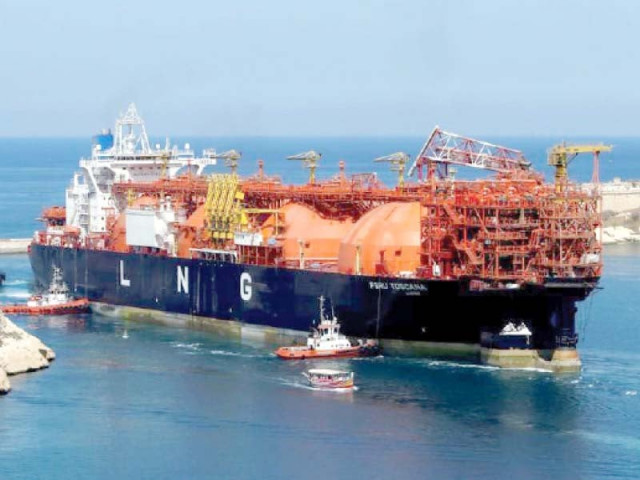Gas crisis feared as LNG price soars
To cope with this situation, Pakistan can slash fuel imports during winter

The spot price of liquefied natural gas (LNG) has shot up beyond affordable levels and touched an all-time high of $56.3 per million British thermal units (mmbtu) in the Asian market ahead of the winter season, indicating a brewing gas crisis in Pakistan.
Pakistan has already imported two cargoes of LNG from the spot market in September at the then record high price of slightly above $20 per mmbtu.
“Asia LNG benchmark JKM surged to an all-time high of $56.3 per mmbtu (about $320 per barrel of oil equivalent),” Bloomberg News Chief Energy Correspondent Javier Blas reported on his official Twitter handle on Tuesday.
Pakistan has no control over LNG prices in Asia and global spot markets. It, however, may slash import of the fuel for the next couple of months to avoid the high price and adopt alternative solutions during winter.
“LNG price may remain elevated globally till December-January due to the winter season,” independent macroeconomist Ammar H Khan said while talking to The Express Tribune. “It is available at $20-22 per mmbtu on the January futures counter.”
Pakistan has been facing a gas crisis during winter season for the past three consecutive years and the spike in global LNG price suggests that the crisis will erupt for the fourth straight year under the Pakistan Tehreek-e-Insaf (PTI) government.
The consumption of gas rises in most parts of the country in the winter season as households turn on heaters and geysers after temperature falls below zero degree Celsius. Pakistan’s dependence on imported energy is on the rise due to low production of oil and gas from local fields.
People living in cold areas might use electric heaters and generators this winter after the government announced a reduction of Rs5-7 per unit on the additional use of electricity compared to the same period last year, Khan said.
“The cabinet has approved the seasonal electricity package,” Federal Minister for Energy Hammad Azhar said on his Twitter handle on Tuesday. “Any additional electricity consumed by domestic and commercial consumers during Nov-Feb period compared to the same time of previous year will have a discount of Rs5 to 7 per unit.”
Some of the developed nations including Japan have built gas storages, which is a costly option. However, emerging countries like Pakistan should ink more long-term contracts with LNG suppliers to avoid volatility in gas prices, Khan said.
Read Asian LNG prices set to spike more this winter
Out of the total of 1,200 million cubic feet per day (mmcfd) of gas imported by the country, Pakistan buys around 30-35% from the spot market and imports the rest under long-term contracts with suppliers at an average price of 12.5% of Brent crude.
The LNG price under the long-term contracts is estimated at around $15 per mmbtu, considering the price of Brent, which shot up to a multi-year high of $81.5 per barrel on Tuesday.
Out of the total gas supplies of 4,600mmcfd in Pakistan, the share of imported gas stands at 26% (1,200 mmcfd). Local gas exploration firms produce around 3,400 mmcfd from domestic fields.
The forthcoming winter seems to be tougher due to expectation of low supply of gas. “CNG fuel stations may remain completely shut and industries might also face low supplies and/or outages,” Khan said.
The government has cut electricity price for winter in a bid to enable people to use electrical equipment like heater and geyser in winter instead of using gas-fired equipment. The government might increase power production from furnace oil and coal as the two commodities have emerged as affordable options after the price of LNG shot to the sky, the macroeconomist said.
“The government might purchase fuel from LNG spot market to maintain gas supplies, considering the spot price would become affordable after being mixed with the price of long-term contracts,” he said.
Besides, it should give incentives to local oil and gas exploration firms to make new discoveries and ramp up production. The circular debt has prevented them from performing better.
Published in The Express Tribune, October 7th, 2021.
Like Business on Facebook, follow @TribuneBiz on Twitter to stay informed and join in the conversation.



















COMMENTS
Comments are moderated and generally will be posted if they are on-topic and not abusive.
For more information, please see our Comments FAQ